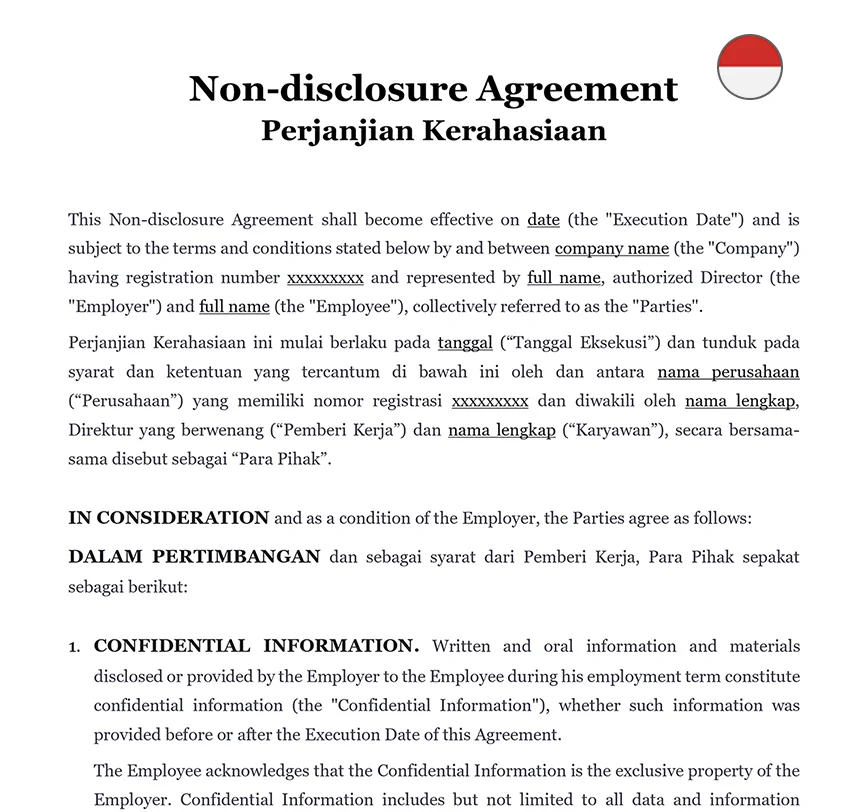Ready to use legal template
Drafted by experienced lawyers
Indonesian-English translation
Ready to use legal template
Drafted by lawyers
Indonesian-English translation
Learn more about Employee Confidentiality Agreement in Indonesia
In Indonesia, an employee confidentiality agreement is a legally binding contract between an employer and an employee in which the employee agrees not to disclose any confidential information about the employer’s business. It is particularly useful at the end of an Employment Contract or when a company wants to ensure that its employee does not reveal any information after having sent a Warning Letter or even a Termination Letter. With our template, written by lawyers who follow the local jurisdiction, you can establish a culture of trust and integrity within your company and will be sure that your company has its confidential information and trade secrets protected.
Table of contents
-
What is an employee confidentiality agreement in Indonesia?
-
What information are protected under an employee confidentiality agreement?
-
What are the implications for employees who violate it under Indonesian law ?
-
How can companies communicate and enforce it?
-
What are the best practices for drafting and implementing it?
-
How does Indonesian confidentiality agreements differ from other countries?
-
How can companies protect their confidential information in the digital age?
-
How do employee confidentiality agreements relate to non-compete agreements?
What is an employee confidentiality agreement and why is it important?
An employee confidentiality agreement is a legally binding contract between an employer and an employee that prohibits the employee from disclosing confidential information belonging to the employer.They are important for companies in Indpnesia as they provide legal protection for a company’s sensitive information and help maintain the company’s competitive edge. Confidential information is often a crucial aspect of a business’s operations and it’s important for companies to keep it secure. They also help prevent former employees from using proprietary information for their own benefit after leaving the company.
What information are protected under an employee confidentiality agreement?
An employee confidentiality agreement typically protects a wide range of confidential information belonging to the employer. This can include :
1. Trade secrets such as confidential business plans, financial information, product development plans, and customer lists
2. Sensitive information about the employer’s operations, such as internal policies and procedures, and information about the employer’s employees and business partners.
3. Personal data of employees, clients, or customers.
The agreement may also prohibit employees from disclosing proprietary or confidential information to third parties, or from using it for personal gain.
ℹ️ It is important to note that any such agreement should not violate the employee’s rights under Indonesian labor laws. For instance, the Indonesian Labor Law provides for summary termination due to serious misconduct, which includes disclosure of confidential information.
What are the implications for employees who violate it under Indonesian law?
In Indonesia, employees who violate a confidentiality agreement may face serious consequences. If an employee breaches the confidentiality agreement, the employer may take disciplinary action, including termination of employment. If the violation results in harm to the employer, the employer may have a claim for damages against the employee for breach of contract.
Moreover, if the employee’s actions are found to be in violation of any laws or regulations, they may be subject to criminal or civil liability. For instance, if the employee’s actions involve the unauthorized disclosure of personal data, they may be in violation of Indonesia’s Law No. 27 of 2022 on the Protection of Personal Data
How can companies communicate and enforce it?
Companies can communicate and enforce employee confidentiality agreements by clearly outlining the terms and expectations in the agreement and providing training to employees on their obligations under the agreement. The agreement should be signed by the employee as a condition of their employment and should be prominently displayed in the workplace. Companies can also periodically remind employees of their obligations under the agreement and have strict disciplinary measures in place for any breaches.
Additionally, companies should have a process in place for handling and reporting any potential breaches of confidentiality. Our template is written by lawyers who follow the local juridiction to ensure that the confidentiality agreements comply with all applicable local laws and regulations.
What are the best practices for drafting and implementing it?
When drafting and implementing employee confidentiality agreements, it is important to :
1. Clearly define what information is considered confidential and what the consequences are for disclosing it without authorisation.
2. Specify how long the confidentiality obligation lasts, as well as any exceptions to the agreement.
3. Make sure that the agreement is consistent with any applicable laws or regulations. That is why themis partner offers you a template that is drafted by lawyers who follow the local jurisdiction
4. Have employees acknowledge in writing that they have read and understand the agreement, and to periodically remind them of their obligations under the agreement.
5. Have a process in place for handling breaches of the agreement and to enforce the agreement consistently.
How does Indonesian confidentiality agreements differ from other countries?
Confidentiality agreements in Indonesia may differ from those in other countries due to the country’s specific laws and regulations. While confidentiality is mostly governed contractually, the legal landscape governing data privacy in Indonesia is multifaceted and continually evolving.
In Indonesia, personal data protection regulations are scattered and can be found in the Law on Electronic Information and Transactions (EIT Law), health and medical records regulations, and demographic administrative law. The Indonesian government is addressing the growing importance of personal data protection in the digital age by drafting a bill (the PDP Bill), which is currently being finalized.
The PDP Bill has been designed to become the overarching privacy law in Indonesia. Based on the EU’s General Data Protection Regulation (GDPR), the PDP Bill has made some significant and much-needed changes to data privacy protection, and will bring it more in line with standards currently applied by other countries, especially the GDPR.
How can companies protect their confidential information in the digital age?
Protecting confidential information in the digital age can be challenging for companies in Indonesia, as technology has made it easier for information to be shared and accessed by unauthorised parties. However, there are several measures that companies can take to safeguard their confidential information.
| ➤ One important step is to implement strict security protocols and controls, such as firewalls, encryption, and password protection, to protect sensitive information stored on company servers and devices. |
| ➤ It's also important to educate employees on proper cyber security practices and the importance of keeping confidential information secure. |
| ➤ Companies can use advanced technologies like data loss prevention software, which can detect and prevent the unauthorised sharing of sensitive information. |
| ➤ Another important step is to review and update company policies and procedures regularly to ensure that they are in line with current industry standards and best practices. Implementing regular security audits and vulnerability assessments can also help identify any potential risks and vulnerabilities that need to be addressed. |
| ➤ Finally, it's important for companies to have a clear plan in place for responding to any data breaches that may occur and to have an incident response team to help mitigate the damage. |




